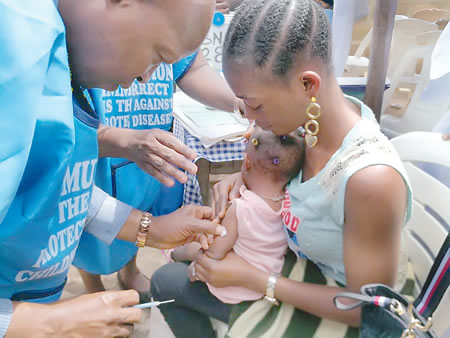DESPITE the World Health Organisation’s (WHO) regional measles elimination objective for 2020, Nigeria reported more than 10,000 suspected measles cases during the first eight months of 2021.
From January 1 through August 31, 10,106 suspected cases have been reported, including the 189 cases seen in August, according to a Nigeria Centre for Disease Control (NCDC) report. In the previous year, the number of measles cases reached 93,000.
More than six out of 10 cases were reported from three states: Borno (5,614), Ekiti (408) and Oyo (328).
Cumulatively, a total of 110 local government areas across 29 states and FCT have recorded at least one measles outbreak in the current year (2021).
Three-quarters of confirmed cases were reported in children nine to 59 months in age. Of the confirmed cases, 87 deaths were recorded.
Measles was once a common childhood disease and almost an expected part of growing up. Although it can affect anyone, children under the age of five are more susceptible to the virus. This highly infectious viral disease spreads through airborne droplets created when an infected individual coughs, sneezes or speaks.
A researcher’s analysis indicated that 203,089 measles cases were reported to the surveillance system from 2008–2018, while 85.5 per cent were from the North.
The incidence rate is higher among the nine to 11 months (524.0 per million) and 12–59 months (376.0 per million).
Among confirmed cases in children less than five years of age, more than 71.3 per cent were not vaccinated. For cases between 10 and 19 years of age, between 60.3 per cent and 64.5 per cent are not vaccinated depending on age group and for those 20 years and older, 72.6 per cent are not vaccinated.
The report, according to the 2021 journal, Vaccine, added that over the 11-year period, the incidence rate had shown geographical variation, with a higher incidence in the North (70.6 per million) compared to the South (17.8 per million). The United Nations Children’s Fund (UNICEF) says Nigeria tops the list of unvaccinated children across the world, making the country among the 20 sub-Saharan countries with children not vaccinated for measles.
UNICEF’s boss, Henrietta Fore, in a report said, “Worldwide coverage levels of the second dose of the measles vaccines are even more alarming. Of the top 20 countries with the largest number of unvaccinated children in 2017, nine have not introduced the second dose. “20 countries in sub-Saharan Africa have not introduced the necessary second dose in the national vaccination schedule, putting over 17 million infants a year at higher risk of measles during their childhood.”
Howbeit, Dr Babatunde Ogunbusi, a pediatrician at the University College Hospital (UCH), Ibadan, stated “we still see outbreaks of measles, but its incidence is not as bad as before. Cases of measles definitely have reduced.”
Dr Ogunbosi declared that symptoms of measles that mothers should watch out for include fever, cough, runny nose, red eyes, and a red rash that begins on the face and spreads downward.
He, however, said that rubbing fresh palm wine and giving a little of the drink to treat the red rash on the face and body of children with measles has not been proven to be effective scientifically.
“We have a case definition for measles; once a baby has any of cough, red eyes, fever or catarrh, it is better the child be taken to the health centre and evaluated to rule out measles. If it is not measles, other possible causes can be ruled out and treated appropriately.
“Serious complications of measles, including blindness, ear infection, diarrhea, pneumonia, and death can occur, especially in children younger than five years old, adults older than 20 years old, and people whose immune systems are weakened by other acute or chronic health conditions,” he said.
He stated that although underlying malnutrition can predispose children to come down with measles even after doses of the measles-containing vaccine, the greatest challenge was poor access to the vaccine.
Professor Tanimola Akande, a public health physician at the University of Ilorin Teaching Hospital, added “the immunisation coverage in Nigeria is still very low; only one in four children has taken their full immunisation as a child as at the data for 2017.
“There has been a little improvement over that since 2017. Although WHO says that for optimum coverage, 80 per cent of children under-two years should have been fully immunised, we are still far from it. The last coverage done in 2017 was 33 per cent; with the recent interventions, maybe we have reached about 40 per cent. That is the challenge.”
Professor Akande said some vaccinated children were not immunised against measles because the potency of the vaccine they were given was compromised due to poor vaccine storage.
Also, he added that demand for measles vaccine is low because mothers are not aware that children should take the vaccine, health facilities are not close by and they cannot afford to pay for transportation, and many health facilities don’t give immunisation every day especially in rural areas.
“A lot of children that missed it will have to wait till maybe the next month and they do that because they don’t have a large number of children. So they don’t want to open the vial; they think that it will waste. A vial might contain 10 to 20 doses and if they are given to only two children, the rest will waste.
“So, what we need to do is to have outreach services, so that big health facilities will go to villages and then cover so many children for that day. We don’t have the outreach services functioning very well because it requires money. The government is not giving money for that and people are not motivated too. So, measles is likely to be with us for a long time,” he said.
Professor Akande said there is only international support by donors like GAVI for vaccination in Nigeria, adding “donors like GAVI and Gates Foundation are doing a lot to support vaccination locally, but the little effort is towards polio; we don’t have people locally who are interested very much in supporting routine immunization with their money.”
Moreover, Professor Akande added that security was a challenge to ensure children are vaccinated particularly in Northern Nigeria.
“For example, in some states in the other parts of Nigeria, immunisation coverage is almost 80 per cent, but in the North, we have states where immunization coverage is about 20 per cent. It is about supply and demand. “The supply is not about a shortage of vaccines, it is about reaching those children. The demand is very low; the mothers see bringing their children to receive their due vaccines as the least of their problems. They say that they are too busy.”
He declared that measles vaccine will not prevent children getting the infection, but it ensures that its severity is not much should they get infected. Despite pointers to measles remaining in Nigeria for years to come, he said the only way to prevent a measles epidemic and cut down on children infected or developing complications of measles will be ensuring that all children get vaccinated.
He stated: “When the epidemic of measles is there, then you rush to do some campaigns of immunising children around those communities. All these are fire brigade approach; what we need to do is to strengthen our routine immunisation.
“In a pilot study, the National Primary Health Care Development Agency (NPHCDA) through an initiative is supporting facilities in the urban areas with funds to be able to give immunisation in the rural area to children at least once a week. If they are able to do it for the whole country, then it will go a long way to strengthen routine immunisation and bring down cases of measles and other vaccine-preventable childhood diseases.”
Measles is highly contagious and requires at least 95 per cent immunisation coverage in the population to prevent outbreaks. Yet, according to WHO Regional Director for Africa, Ms Matshidiso Moeti, coverage with the first dose of the measles-containing vaccine has stagnated at around 69 per cent in the WHO African Region since 2013.
Only seven countries in the region achieved 95 per cent measles-containing vaccine coverage in 2019. Dr Stephen Ilesanmi, a public health expert at the College of Medicine, University of Ibadan, stated that although the level of preparedness for measles had improved, it is still not optimal because utilization of immunization services is still poor in hard to reach and security compromised areas limiting access to deliver lifesaving routine vaccines.
He added, “To ensure coverage for hard-to-reach areas, the strategies that were used for polio elimination could be adopted to increase immunization coverage of children.
“People who are immunising in those areas are people resident in that community, and all that will be difficult will be to get the vaccine to them. Also, measles elimination must leverage upon existing structures for polio elimination to improve surveillance.”
Dr Ilesanmi said poor funding for health services was also a challenge in ensuring children are adequately vaccinated. “Generally budget for health care is not optimal, not only in Nigeria. It is not up to what it is meant to be. It is not only for measles, it affects other aspects of the health sector. There is the need to do more; there is a need for more commitment and the end to do more for an increased health budget.”
Nigeria has currently revised its measles elimination target to 2028 in light of the unlikely chance of accomplishing the 2020 target. Consequently, it is essential to establish a current performance of the measles case-based surveillance system and a locally funded vaccination campaign is central to decreasing the number of cases, even in the remote parts of Nigeria to ensure countless lives were saved.
YOU SHOULD NOT MISS THESE HEADLINES FROM NIGERIAN TRIBUNE
Lagos Is Second Least Liveable City In The World For 2021
Lagos is the second least liveable city in the world for the year 2021. This is according to the most recent annual ranking put together by the Economist Intelligence Unit (EIU)…
CLAIM 1: A Twitter user claims UNICEF said any efforts to block children from accessing pornography might infringe their human rights.
VERDICT: MISLEADING!
WATCH TOP VIDEOS FROM NIGERIAN TRIBUNE TV
- Let’s Talk About SELF-AWARENESS
- Is Your Confidence Mistaken for Pride? Let’s talk about it
- Is Etiquette About Perfection…Or Just Not Being Rude?
- Top Psychologist Reveal 3 Signs You’re Struggling With Imposter Syndrome
- Do You Pick Up Work-Related Calls at Midnight or Never? Let’s Talk About Boundaries






